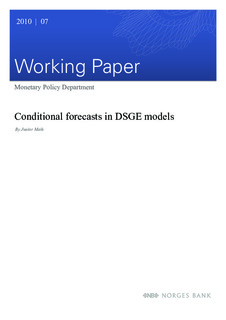| dc.contributor.author | Maih, Junior | |
| dc.date.accessioned | 2018-05-08T07:22:03Z | |
| dc.date.available | 2018-05-08T07:22:03Z | |
| dc.date.issued | 2010 | |
| dc.identifier.isbn | 978-82-7553-553-3 | |
| dc.identifier.issn | 1502-8143 | |
| dc.identifier.uri | http://hdl.handle.net/11250/2497456 | |
| dc.description.abstract | New-generation DSGE models are sometimes misspecified in dimensions that matter for their forecasting performance. The paper suggests one way to improve the forecasts of a DSGE model using a conditioning information that need not be accurate. The technique presented allows for agents to anticipate the information on the conditioning variables several periods ahead. It also allows the forecaster to apply a continuum of degrees of uncertainty around the mean of the conditioning information, making hard-conditional and unconditional forecasts special cases. An application to a small open-economy DSGE model shows that the benefits of conditioning depend crucially on the ability of the model to capture the correlation between the conditioning information and the variables of interest. | nb_NO |
| dc.language.iso | eng | nb_NO |
| dc.publisher | Norges Bank | nb_NO |
| dc.relation.ispartofseries | Working Papers;7/2010 | |
| dc.rights | Attribution-NonCommercial-NoDerivatives 4.0 Internasjonal | * |
| dc.rights.uri | http://creativecommons.org/licenses/by-nc-nd/4.0/deed.no | * |
| dc.subject | JEL: C53 | nb_NO |
| dc.subject | JEL: F47 | nb_NO |
| dc.subject | DSGE model | nb_NO |
| dc.subject | conditional forecast | nb_NO |
| dc.title | Conditional Forecasts in DSGE Models | nb_NO |
| dc.type | Working paper | nb_NO |
| dc.description.version | publishedVersion | nb_NO |
| dc.subject.nsi | VDP::Samfunnsvitenskap: 200::Økonomi: 210::Samfunnsøkonomi: 212 | nb_NO |
| dc.source.pagenumber | 29 | nb_NO |

